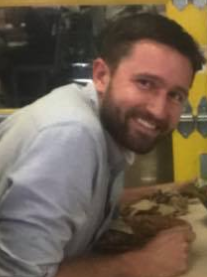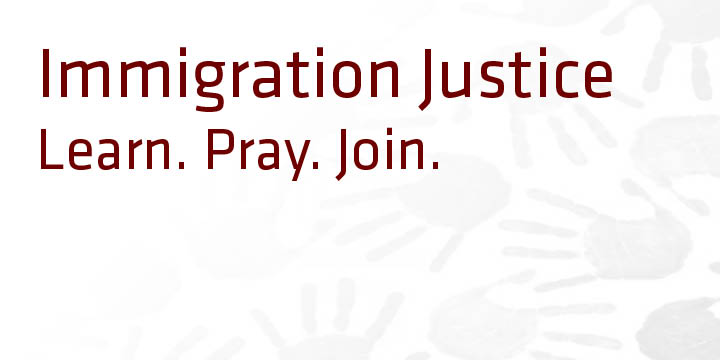 John Garland is the part-time pastor of San Antonio (Texas) Mennonite Church, in the heart of the city. His wife is a high school principal just over the river and his two daughters go to the neighborhood elementary school. He raises vegetables for the local market. Before San Antonio, John and the family lived on the southern border of Texas where he was the pastor of Iglesia Menonita Buenas Nuevas for eight years.
John Garland is the part-time pastor of San Antonio (Texas) Mennonite Church, in the heart of the city. His wife is a high school principal just over the river and his two daughters go to the neighborhood elementary school. He raises vegetables for the local market. Before San Antonio, John and the family lived on the southern border of Texas where he was the pastor of Iglesia Menonita Buenas Nuevas for eight years.
Over the course of three posts, John will offer some perspective on five facets of the refugee crisis on our southern border and five ways individuals and congregations can respond. Read part one here.
Part Two
Context
Compiled from the experience of a Mennonite pastor in San Antonio, there are included suggested Bible stories to read while you discern your response, a check on popular myths that surround this crisis, and a brief human anecdote from my experience here in this city.
The historical context is complicated, and the complexity of the current crisis is overwhelming. The root, however, is the extreme violence in Guatemala, El Salvador and Honduras, particularly against women. A brutal combination of gangs and corruption has resulted in horrors of human trauma that families are risking everything to escape. The journey through Mexico is extremely dangerous and violent, oftentimes controlled by trafficking cartels that mislead and extort the desperate refugees. If they make it to our border on this sacred journey to save their children, it is miraculous. They arrive traumatized and broken, holding on only to the glimmer of hope that the United States is a land of freedom.
Separated and Detained Families
The Circumstance: Families flee the extreme violence of Central America with a hope that in the United States they can find asylum. Many times, gangs have threatened them with extortion, torture or death, with the complicity of cowed local authorities. With the immediate threat, there is no time to wait through the weeks-long process at a U.S. Embassy, so they leave with everything they have. These families are generally the business owners and entrepreneurs of their towns who have some savings. As they progress through Mexico, they are extorted by gangs and cartels, or they fall into the hands of human traffickers with false promises of lenient laws in the U.S. These families are guided illegally across the border with the understanding that the Border Patrol will guide them through an official asylum case. They seek out officials and are immediately detained. Fathers are taken from the families and placed in male-only facilities where their hearings are expedited and they are quickly deported. Mothers and children are put in different facilities. Through most of the 2018 summer, children where separated from mothers, creating a nightmare situation of traumatizing family separation for thousands. Currently (July, 2018) the best-case scenario for these families is that the mother is still with the child in detention, while the worst-case is that the family is completely separated — husband from wife from child. In both, families who believed they could legitimately seek asylum in the “land of the free” have been decimated.
What you can do: To support family reunification efforts, please reach out to Catholic Charities (in San Antonio, they have been named by the Federal Government to facilitate the reunification of hundreds). As an individual or church, support immigration attorneys who are working in the detention centers. The majority of refugees have no representation and the majority of attorneys working on their behalf are working pro-bono (without pay). Your community could pay an organization of attorneys or an individual office to represent a refugee to make this process more sustainable (each asylum case costs at least $3000 to process).
A False Myth: These families should know better! They’re breaking the law and they should have just come here legally through an Embassy. In truth: These families are desperately trying to save their children’s lives. Waiting for weeks to be processed at an overwhelmed Embassy is not realistic when your children are under threat of rape, murder, or gang kidnapping. In their flight, they are fed lies by human trafficking gangs who make false promises in exchange for life savings. They have no access to accurate political news or legal advice. They give up everything they have, and all of their resources to get to the U.S. border in the hope that they will save their children’s lives. Few make it, and when they do, it is miraculous.
A Human: I met a young woman in detention south of San Antonio. Her husband had been taken away from them at the border. Her daughter had been taken from her arms days later. She thought she knew the name of the center where her daughter was sent, but wasn’t sure. She was in the courtroom of the detention center to ask the judge for a ruling of “credible fear” (meaning that her reason for fleeing her home was worthy) to begin her asylum process. Her eyes were puffy with weeping, and she continued to sob in the courtroom. An attorney entered the room, asked her last name, and began to work through her case. The woman’s face lit up with hope. Suddenly the attorney realized she had mistaken the woman with the common last name as the person she had been paid to represent. She excused herself and quickly left. The woman, after a moment, collapsed into sobs, until a court bailiff roughly shushed her. Alone, she did not succeed in her hearing. I don’t know what happened next in her life.
From Scripture: Reflect on Jeremiah 22, an instruction on how to treat to treat people who have been robbed a, as well as used and the great danger posed to a nation if any damage is done to orphans a. widows.
Released Parents and Children
 The Circumstance: Women and their children who have been detained together (fathers are often separated out and deported) are held for only 20 days (based on a ruling about the amount of time that is humane to imprison a child). These mothers are expected to find “sponsors” in the United States to pay for bus or plane tickets from their detention centers. If they are able to find sponsors, the mothers are fitted with GPS-monitored ankle shackles, given a court date in the area their sponsor lives, and dropped off at the Greyhoud bus station or airport. With no money or food, unable to fully understand their tickets, and with a child who has often been made ill by the conditions of detention, these mothers are extremely vulnerable and desperately in need. If they find aid to make it to their destination, it is possible that their debt to their ticket-buying sponsor can lead to abuse or human-trafficking.
The Circumstance: Women and their children who have been detained together (fathers are often separated out and deported) are held for only 20 days (based on a ruling about the amount of time that is humane to imprison a child). These mothers are expected to find “sponsors” in the United States to pay for bus or plane tickets from their detention centers. If they are able to find sponsors, the mothers are fitted with GPS-monitored ankle shackles, given a court date in the area their sponsor lives, and dropped off at the Greyhoud bus station or airport. With no money or food, unable to fully understand their tickets, and with a child who has often been made ill by the conditions of detention, these mothers are extremely vulnerable and desperately in need. If they find aid to make it to their destination, it is possible that their debt to their ticket-buying sponsor can lead to abuse or human-trafficking.
What you can do: At the center of the majority of the detention facilities, the Interfaith Welcome Coalition in San Antonio works in the bus station and airport to guide and support these mothers and children on their journey. Your community could support this group’s work to supply resource backpacks and guidance, or you could expand this Welcome network to the major bus terminals and airports near you.
A False Myth: These women are using children to sneak through the system, then they skip their court dates and use our national resources to pay for the care of their children. In truth: These mothers are desperately trying to save their children. They are at enormous risk with no resources. They overwhelmingly meet their legal obligations because they believe in the United States system of justice (and have staked everything they have on it).
A Human: On a recent Greyhound bus trip from San Antonio, I sat across the row from a woman just out of detention. She had on a prison sweat suit, a GPS monitor on her ankle, and all of her possessions were in a little shopping bag. Her child was obviously feverish (as often the children who come out of cold, densely populated prison cells are) and she held her tight to her breast. The child rotated between crying-out and sleeping, in that familiar pattern of a virus, so obvious to any parent, oscillating between incubation and attack on the little child’s cells. The shrieking of the child was painful, but the bus driver did not understand what was going on. He said over the bus intercom that the child needed to be quiet. Half an hour later, with no change, the bus driver pulled over in a fury, turned on the cabin lights and walked back to the woman holding her febrile child. “You need to make that child be quiet,” he said. A lady a few rows back said, “She doesn’t speak English, sir. May I translate?” He said “Please,” and then she said in Spanish, “He wants to know if there is anything that we can do to help.” At the next rest stop, a fellow bus rider came back on board with infant fever reducers and Pedialyte.
From Scripture: Contemplate Acts 16:16-40. What are the experiences and actions of the jailer? What is the legal and spiritual fall-out of Paul and Silas’ misdemeanor?
______________________________________________________________________________
This post is part of MC USA’s Immigration Justice: Learn, Pray, Join initiative.
With hope we pray for justice for immigrants seeking peace, wholeness and safety in the United States and around the world. We invite congregation to use Peace Sunday prayers and worship resources: “A renewed peace church welcomes the stranger,” created by Mennonite World Conference for worship on Sept. 23.
Consider ways you can actively support immigration justice:
1. Learn skills to help facilitate intercultural competency and/or undoing racism processes in congregations through the Intercultural Development Inventory or invite one of the 18 qualified administrators across MC USA to work with your congregation.
2. Advocate for just and humane immigration policies for immigrants and refugees by contacting your local, state and national elected officials.
3. Offer church facilities and volunteers for immigration documentation services, language classes, mental health support, cultural celebrations, after-school homework help and other ministries.
4. Engage in mutual aid to offer food, shelter, clothing, housing, transportation and other resources to immigrants regardless of their status.
5. Donate to MC USA to support congregations and projects working with immigration justice initiatives addressing family separation, detention centers, Deferred Action for Childhood Arrivals (DACA) and legal assistance.

